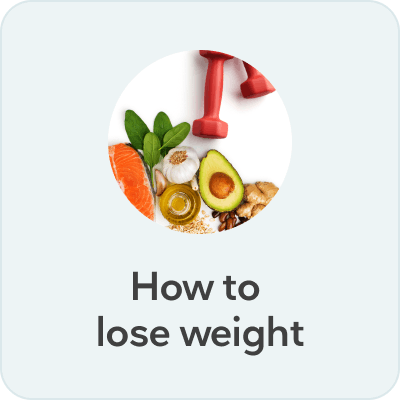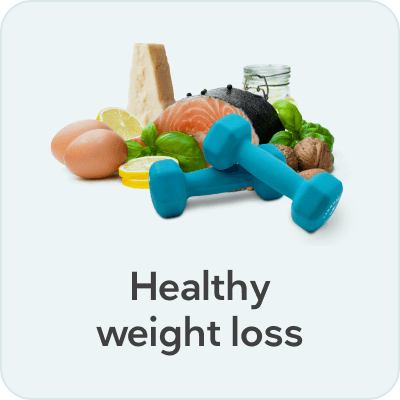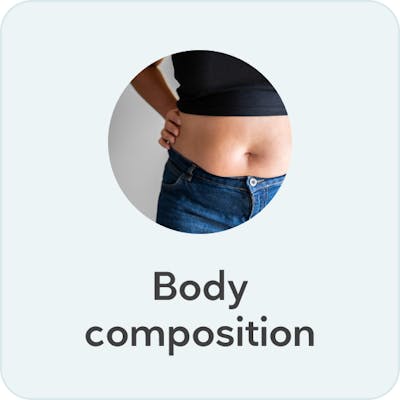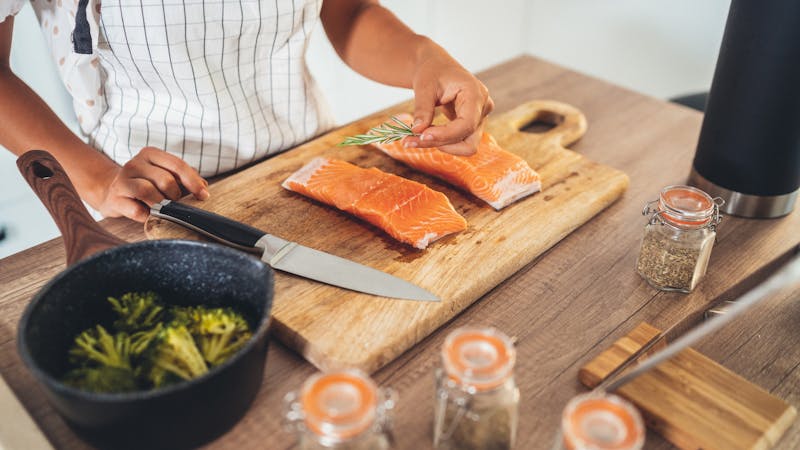Evidence based
What is healthy
weight loss?
Are you interested in losing weight? You’re not alone. Millions of people are trying to lose weight at this very moment.
It’s true — which likely leads you to ask: how can you lose weight in a healthy way?
A common approach to weight loss is to “count calories in and calories out,” which suggests a set formula for weight loss: In theory, if you create a certain calorie deficit, you’ll lose a certain amount of body weight.
But losing weight in a healthy way is often not that simple. You don’t always lose the expected amount of weight despite the “right” calorie deficit. Your body’s hormones, especially insulin, may limit the amount of fat you can burn, even when you reduce calories. Some people may respond to that unexpected outcome by reducing calories even more.


But by doing this, you may lose precious muscle and bone mass, not just excess body fat.
Changing what you eat, not just how much, can help you lose the kind of weight you want to lose: excess body fat.
Losing weight in a healthy way means:
- Setting realistic weight loss goals in terms of the time it takes to lose weight and the amount of weight you want to lose
- Getting adequate nutrition (including protein) in whatever diet you choose
- Managing hunger
- Choosing foods and activities that help protect lean body mass
- Choosing foods and activities that help improve metabolic health
- Getting enough protein and energy from your diet to protect your resting metabolic rate
- Enjoying your diet so you can maintain it long term
- Having a diet that fits your lifestyle
Setting realistic goals
Healthy weight loss begins with setting realistic goals for yourself. Working towards weight loss to improve your health or quality of life is one thing; it’s another to try to lose as much weight as you can as fast as you can so you look better in a bathing suit.
While there’s nothing inherently wrong with losing weight quickly, you don’t have a lot of control over how fast your body is willing to let go of its fat stores.
Social media doesn’t do you any favors when it comes to realistic expectations. Just because one person can drop eight sizes to a size zero doesn’t mean you can too. Your body may be healthy at a larger size, even after losing weight.
You have different genetics from other people (unless you have a twin!), and a different life situation. Run your own race. Set your own goals. Don’t let shiny Instagram posts alter your course.
For more on how — and why — it’s important to have reasonable goals for losing weight, see our guide on setting realistic expectations for weight loss.
Getting adequate protein and nutrition
There are two key nutritional factors to losing weight in a healthy way. We tend to pay the most attention to creating a calorie deficit, which requires your body to use stored energy. But the other important factor is ensuring that your body is adequately nourished, even with fewer calories.
How you accomplish this is mainly a matter of priorities: eat more of the foods you need for essential nutrients and less of the foods that don’t provide much nutrition.
What foods supply the most important nutrients to your body? Protein is the most important macronutrient because you need a plentiful supply of essential amino acids — the building blocks of protein — nearly every day.
After that, you need foods that supply micronutrients, which are needed in smaller amounts than protein, such as vitamins, minerals, and essential fatty acids. Protein foods from plants and animals provide a lot of these as well — making them an all-around good choice for nourishment.
Quick quiz
What diets will provide you with a healthy supply of protein and nutrition?
Answer: Practically any diet that includes mostly whole foods and limits high-energy, low-nutrition foods.

Diets from keto to vegan can be based on pizza, soda, and treats. Or, these same diets can be based on whole foods — meaning meats, eggs, and dairy for keto, legumes and whole grains for vegan, and plenty of vegetables for both.
If any well-planned diet can lead to healthy weight loss, how do you know which diet to use? Diet Doctor’s guide helps you answer the question: “What diet is right for you?”
Taming hunger
Deliberately cutting calories can undoubtedly help you lose weight — at least in the short term. Unfortunately, you usually have to put up with one very unpleasant side-effect: hunger. The hungrier you are, the more likely you are to give up on your diet.
To lose weight in a healthy way, you need a diet that doesn’t leave you hungry and helps you reduce calories. Sounds almost impossible, doesn’t it?
Fortunately, science shows that some ways of eating can do both — without the need for superhuman willpower, which is often a limited resource.
Diets higher in protein and lower in carbohydrates can help you lose weight with less hunger — improving your chances of long-term success.
Maintaining lean body mass
With healthy weight loss you will lose mostly fat mass, with minimal — if any — loss of lean mass. Eating adequate protein and doing resistance exercise regularly helps you lose fat mass, while increasing or maintaining your muscles and bones — the main components of lean mass.
Short-term intermittent fasting (when done correctly) and low-carb diets can also help maintain lean mass.
Improving metabolic health
A healthy weight loss diet shouldn’t just make the numbers on the scale go down; it should also help you get healthy “numbers” in other respects — and generally make you feel good.
For instance, a healthy weight loss diet is one that improves measures of metabolic syndrome — a cluster of values that indicate a significantly increased risk of future chronic disease. These include blood sugar, blood pressure, triglycerides (a type of fat in the blood), high-density lipoprotein (HDL) cholesterol (often called “good cholesterol”), and waist circumference.
While many ways of losing weight can help with these metabolic health markers, scientific evidence suggests that low-carb diets are likely the most effective and may improve metabolic health even in the absence of weight loss.
Make sure to track your metabolic numbers, together with your healthcare provider, to ensure your weight loss is progressing in a healthy manner.

Protecting metabolic rate
Long-term success with healthy weight loss depends on protecting your metabolism — aka your resting metabolic rate (RMR).
Briefly, your RMR is the amount of energy/calories your body burns each day to stay alive. Interestingly, this number can change over time.
Researcher Kevin Hall studied participants in the weight loss TV show “the Biggest Loser.” The participants underwent an “eat less and move more” program with calorie restriction and increased exercise.
Lowering your RMR when food is scarce makes sense from an evolutionary perspective. During times of famine, you wouldn’t want to continue to lose weight. Your body would lower your energy expenditure to maintain weight and prevent further loss.
In today’s industrialized world, reducing your RMR is no longer helpful to most people. Instead, it can sabotage your weight loss efforts.
But it doesn’t have to be that way. Following the tips in this guide, including getting adequate nutrition and protein while maintaining your lean mass, can help you lose weight without adversely affecting your resting metabolism.
Enjoying food


Many diets or sets of foods may be able to help you lose weight and improve your health. But if you don’t enjoy eating those foods, what are the chances you’ll stick with it?
Some people may be able to “tough it out” despite the lack of enjoyment. Yet, the majority of people will likely get frustrated and end up abandoning that particular way of eating.
We are all emotional human beings with cravings and specific likes and dislikes. Our way of eating should match those patterns if we hope to have long-term success.
You’ve likely heard the saying: “It isn’t a diet, it’s a lifestyle.” There’s a good reason it’s so popular. Experience shows that those who have the most success with a particular way of eating do so because they can incorporate it into their life. It becomes who they are, not something they do.
For those who have tried the “low-fat, eat-less” approach, enjoying your lifestyle may sound too good to be true. Fortunately, there are many other options, including low-carb or high-protein eating that you may find more palatable.
The bottom line is that a diet doesn’t have to feel like a diet.
No problem!

Matching diet to lifestyle
Enjoying the food you eat is important, but so is matching your food to your lifestyle.
Do you love to cook and have plenty of time every day to prepare fresh meals? Or do you have to eat on the run and grab whatever is quick and convenient?
Do you cook for yourself, or do you also have to prepare meals for family members with different eating habits?
These are important questions when deciding what dietary pattern to follow. A carnivore, omnivore, and vegan can co-exist in the same home with enough planning and determination. But blending opposing approaches means more work for the home cook.
Maintaining your sanity and having your diet fit easily into your lifestyle is yet another crucial aspect for long-term success.
What are the outcomes of healthy weight loss?
As we’ve emphasized in this guide, there are many aspects to consider when evaluating your weight loss progress. You don’t simply want to lose weight; you want to lose weight in a healthy way.
With a healthy approach to weight loss, you can:
- improve your metabolic health
- enjoy weight loss without hunger
- preserve muscle and bone while losing fat
- protect your metabolism
- have a life instead of a diet
- maintain your weight loss long term
How can you achieve all these fantastic benefits? For many, it may be with a low-carb, high-protein diet. For others, it may be a low-carb Mediterranean diet. And still others may find success with a vegetarian whole-food diet. The important point is that if you follow the guidelines presented in this guide, your diet is more likely to help you lose weight and improve your health.









